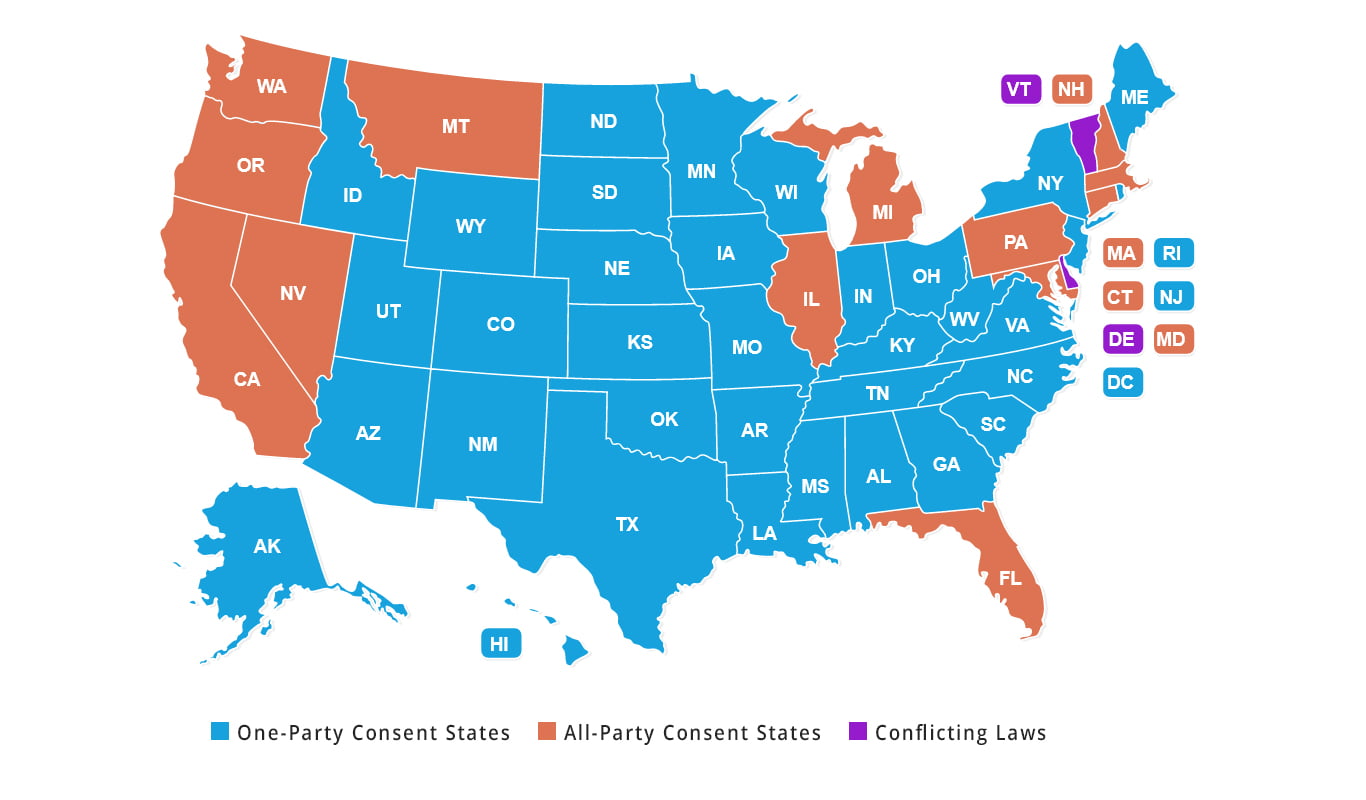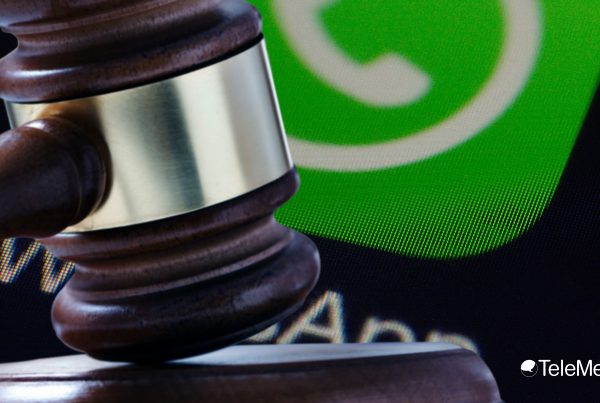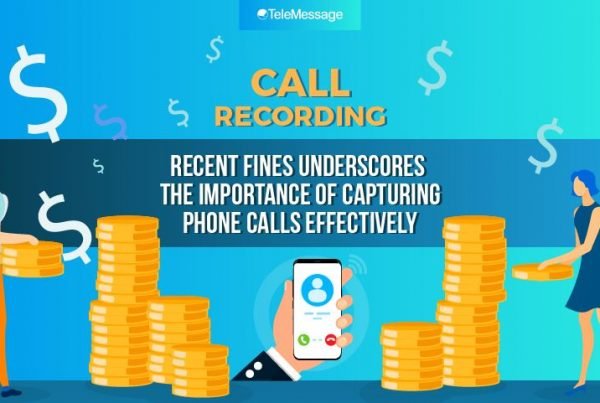In the United States, Federal law and the state laws differ on call recording regulations. While most states need only one-party consent, there are states that require all-party consent (sometimes called two-party consent). So, when in doubt, it is advisable to adhere to the strictest law applicable and get the clear consent of all parties concerned.
In call recording regulations, consent is important only in a conversation that has a reasonable expectation of privacy. For some states, consent must be explicitly given, while for some other states consent shall only be implied.
Federal Law
US Federal Law requires one-party consent, which means that you can record a conversation or a phone call as long as you are party to the conversation. Even if you are not a party to the conversation, you can still record it if one of the participants gives her/his consent or has full knowledge that the conversation will be recorded.
State laws
As mentioned above, state laws differ on call recording regulations. Following are the call recording regulations in all the 50 states.
Alabama
Alabama is a one-party consent state and it requires the consent of at least one-party for call recording of an in-person or telephonic conversation.
Read more about call recording regulations and the Alabama Recording Laws.
Alaska
Alaska requires the consent of one-party and you only need the consent of one party to record phone calls. It is criminal to record an in-person or phone call conversation without at least one party’s consent.
Read more about call recording regulations in Alaska from Alaska Recording Laws.
Arizona
Arizona’s wire-tapping law is a one-party consent law and the state has made it a crime to intercept or record a conversation unless you are a party to the communication, present during the conversation or discussion, or one party to the communication or conversation consents.
Read more about call recording regulations in Arizona from Arizona Recording Laws.
Arkansas
Arkansas is a one-party consent state and it is a criminal offence to record the conversation without the consent of at least one person in the conversation. So you are legally allowed to record a conversation where you are a part of.
Read more about call recording regulations in Arkansas from Arkansas Recording Laws.
California
When it comes to phone call recording or in-person conversations, California is an all-party consent state. California recording law states that recording conversations where either party is on a cell phone or cordless phone without a warning are illegal.
Read more about call recording regulations in California from California Recording Law.
Colorado
Colorado is a one-party consent state and it means you can legally record a phone call or in-person conversation if you are a part of the conversation. However, it is criminal to eavesdrop or record a conversation you are not part of.
Read more about call recording regulations in Colorado from Colorado Recording Law.
Connecticut
Connecticut is a two-party consent state and you need to get the consent of both parties in a conversation to legally record it. The statute however excludes law enforcement and certain other individuals. It is suffice to give notification at the start of the call or a warning tone at 15-seconds interval about the call being recorded.
Read more about call recording regulations in Connecticut from Recording Phone calls in Connecticut.
Delaware
The state of Delaware has conflicting laws. The state’s wiretapping law states that it is lawful to intercept or record a conversation if you are a party to it or if at least one party consents to it. But under Delaware’s state privacy law, which is older, all parties in a conversation must consent to record a conversation.
Read more about call recording regulations in Delaware from Delaware Recording Laws.
District of Columbia
District of Columbia is a one-party consent state as far as call recording is concerned and it is unlawful to intercept or record a conversation without the consent of at least one party in the conversation.
Read more about call recording regulations in District of Columbia from District of Columbia Recording Laws.
Florida
Florida is an all-party consent state and it is illegal to record a conversation without the consent of all parties. If you record the conversation without the consent of all parties you would be liable to provide civil damages.
Read more about call recording regulations in Florida from Florida Recording Laws.
Georgia
Georgia is a one-party consent state and it is illegal to capture a voice call or to intercept a conversation without the consent of at least one party. Violating the law may subject the offender to fines and/or imprisonment.
Read more about call recording regulations in Georgia from Georgia Recording Laws.
Hawaii
On call recording, Hawaii is also a one-party consent state and if you violate the law you may be subjected to the charges of felony. You may also have to face actual and punitive damages on civil suits.
Read more about call recording regulations in Hawaii from Hawaii Recording Laws.
Idaho
Idaho is a one-party consent state and if you record or intercept a phone call or in-person conversation without the consent of at least one party, then you may be fined or imprisoned.
Read more about call recording regulations in Idaho from Idaho Recording Laws.
Illinois
Till 2014, the state’s eavesdropping stature required all-party consent for a conversation to be intercepted or recorded. However, the Illinois Supreme Court held this statute to be overboard and unconstitutional. The statute was amended to allow recording in public places but still requires all parties to consent to record conversations where there is a reasonable expectation of privacy.
Read more about call recording regulations in Illinois from Illinois Recording Laws.
Indiana
According to the state statute, it is illegal to record or intercept telephonic or electronic communication without the consent of at least one party and you may be subjected to charges of felony, punishable by fine and/or imprisonment. But Indiana’s wiretapping statute doesn’t mention in-person conversation at all.
Read more about call recording regulations in Indiana from Indiana Recording Laws.
Iowa
Iowa is a one-party consent state and it can lead to civil liability if someone attempts call recording or intercepts oral, telephonic or other conversation without the consent of at least one party in the conversation.
Read more about call recording regulations in Iowa from Iowa Recording Laws.
Kansas
According to the breach of privacy laws of Kansas, it is a misdemeanour to capture voice calls or to intercept a private conversation without the consent of at least one party.
Read more about call recording regulations in Kansas from Kansas Recording Laws.
Kentucky
Kentucky is a one-party consent state and it is a felony under Kentucky’s eavesdropping laws to record or overhear an oral or wire communication without the consent of at least one party.
Read more about call recording regulations in Kentucky from Kentucky Recording Laws.
Louisiana
According to Louisiana’s Electronic Surveillance Act, it is illegal to intercept or record oral, wire or electronic conversation without the consent of at least one party. Violating the law may subject one to fine and/or imprisonment or civil damages.
Read more about call recording regulations in Louisiana from Louisiana Recording Laws.
Maine
Maine is a one-party consent state and it is illegal to record or intercept oral or phone conversation without the consent of at least one party. Violators will be subjected to a fine and/or imprisonment.
Read more about call recording regulations in Maine from Maine Recording Law.
Maryland
Under Maryland law, all parties must consent for legal call recording or intercepting of oral or telephonic conversations. The courts have however interpreted this to be limited to situations where the parties have a reasonable expectation of privacy.
Read more about call recording regulations in Maryland from Maryland Recording Laws.
Massachusetts
Massachusetts is an all-party consent state and it is illegal to capture voice calls or intercept oral, telephone or wire communication without the consent of all parties.
Read more about call recording regulations in Massachusetts from Massachusetts Recording Laws.
Michigan
Eavesdropping statute of Michigan prohibits recording or intercepting of in-person or telephonic conversations without the consent of all parties, though one court has interpreted the statute as requiring the consent of only one party.
Read more about call recording regulations in Michigan from Michigan Recording Laws.
Minnesota
According to Minnesota law, it is legal to record an oral or telephone conversation with the consent of one party, provided there is no criminal or tortious intention.
Read more about call recording regulations in Minnesota from Minnesota Recording Laws.
Mississippi
Mississippi is a one-party consent state and call recording and recording in-person or phone conversation without the consent of a least one party is illegal. Violations can result in a fine and/or imprisonment and/or civil damages.
Read more about call recording regulations in Mississippi from Mississippi Recording Laws.
Missouri
In Missouri, it is illegal to record or intercept phone conversation without the consent of at least one party. If someone is violating the law, the person may be charged with a felony punishable by fine and/or imprisonment.
Read more about call recording regulations in Missouri from Missouri Recording Laws.
Montana
Montana is an all-party consent state and you need the consent of both parties to record or intercept telephone conversation, except under certain conditions involving public officials/entities, or warning given about the recording.
Read more about call recording regulations in Montana from Montana Recording Laws.
Nebraska
In Nebraska, it is legal to record or intercept an oral or telephone conversation with the consent of one-party, as long as the recording is not done with criminal intent. Violation of the regulation is considered an act of felony.
Read more about call recording regulations in Nebraska from Nebraska Recording Laws.
Nevada
Nevada Supreme Court has held that call recording of telephone conversation without the consent of all parties is illegal. Under Nevada law, recording oral communication without the consent of at least one party is illegal and if you violate the law, you are liable to pay civil damages.
Read more about call recording regulations in Nevada from Nevada Recording Laws.
New Hampshire
According to the state law, it is illegal to record the oral and telephone conversation without the consent of both parties in New Hampshire. The Supreme Court of New Hampshire has however held that a party essentially consented to a recording when the overall circumstances demonstrated that they knew they were being recorded.
Read more about call recording regulations in New Hampshire from New Hampshire Recording Laws.
New Jersey
New Jersey is a one-party consent state and you need the consent of at least one person to record in-person as well as a telephone conversation. The illegal recording is a crime of third-degree and can also result in providing civil damages.
Read more about call recording regulations in New Jersey from New Jersey Recording Laws.
New Mexico
New Mexico is a one-party consent state and recording of telephone conversation without the consent of at least one party is illegal and can subject offenders to civil damages. However, there doesn’t seem to be a law that prevents the recording of an in-person conversation in New Mexico.
Read more about call recording regulations in New Mexico from New Mexico Recording Laws.
New York
According to New York’s eavesdropping law, it is illegal to capture voice calls or record in-person conversation without the consent of at least one party. Violating the rule is considered a felony.
Read more about call recording regulations in New York from New York Recording Laws.
North Carolina
Call recording and capturing voice call and in-person conversation are legal in North Carolina as long as there is a consent from at least one party. Illegal recording of the conversation is considered a felony and can give rise to civil damages.
Read more about call recording regulations in North Carolina from North Carolina Recording Laws.
North Dakota
North Dakota’s Eavesdropping law states that it is legal to do call recording and intercept conversations as long as there is consent from one party, as long as the recording is not done with criminal or tortious intent.
Read more about call recording regulations in North Dakota from North Dakota Recording Laws.
Ohio
Ohio Law states that it is legal to record phone calls and capture mobile calls as long as there is consent from at least one party, provided the call recording is not with criminal or tortious intent.
Read more about call recording regulations in Ohio from Ohio Recording Laws.
Oklahoma
Oklahoma’s Security of Communications Act states that it is illegal to capture mobile calls and intercept in-person conversations without the consent of at least one party. It is also illegal to capture voice calls with criminal or tortious intent.
Read more about call recording regulations in Oklahoma from Oklahoma Recording Laws.
Oregon
According to Oregon law, it is legal to record a telephone conversation if there is consent from at least one party. But to record in-person conversation, you need to have the consent of all parties, except in some circumstances such as when all parties reasonably should have known they were being recorded.
Read more about call recording regulations in Oregon from Oregon Recording Laws.
Pennsylvania
It is illegal to capture voice calls without the consent of both parties in Pennsylvania and offenders are subject to civil liability.
Read more about call recording regulations in Pennsylvania from Pennsylvania Recording Laws.
Rhode Island
It is legal to record in-person and telephone conversations in Rhode Island if there is consent from at least one party. It is illegal to capture voice calls with criminal and tortious intent and violations of the law could is punishable by imprisonment and can also be the basis for civil damages.
Read more about call recording regulations in Rhode Island from Rhode Island Recording Laws.
South Carolina
According to South Carolina law, it is illegal to record the in-person and telephonic conversation without the consent of at least one party.
Read more about call recording regulations in South Carolina from South Carolina Recording Laws.
South Dakota
In South Dakota, it is illegal to capture voice calls and record in-person conversation without the consent of at least one party.
Read more about call recording regulations in South Dakota from South Dakota Recording Laws.
Tennessee
In Tennessee, it is illegal to capture phone calls and record in-person conversation without the consent of at least one party. It is also considered a felony if you record phone calls with criminal and tortious intent. Offenders may be subjected to civil damages, an injunction and/or a restraining order.
Read more about call recording regulations in Tennessee from Tennessee Recording Laws.
Texas
Texas’ laws state that it is a felony to record oral and electronic communications without the consent of at least one party or to capture phone calls with criminal or tortious intent. Offenders could be subjected to civil liabilities.
Read more about call recording regulations in Texas from Texas Recording Laws.
Utah
In Utah, it is legal to record oral and telephone conversations as long as there is consent from at least one party. Illegal recording of phone conversations is considered an act of felony except as it relates to the radio portion of cell phone communications, in which case it is a misdemeanour.
Read more about call recording regulations in Utah from Utah Recording Laws.
Vermont
The state of Vermont has not enacted any law regarding recording conversations. However the Supreme Court of Vermont has maintained that it is an unlawful invasion of privacy for law enforcement officers to secretly make a warrantless recording of a conversation inside a person’s home.
Virginia
Virginia is a one-party consent state and it is illegal to capture voice calls, in-person conversations without the consent of at least one party. Offenders of the law may be subjected to civil liabilities.
Read more about call recording regulations in Virginia from Virginia Recording Laws.
Washington
Washington law requires the consent of all parties for a legal recording of in-person as well as telephonic conversations. Consent is considered given via a reasonably clear announcement made to all parties about the conversation being recorded. The illegal recording is considered a serious misdemeanour and can also lead to civil liabilities.
Read more about call recording regulations in Washington from Washington Recording Laws.
West Virginia
According to West Virginia law, it is legal to capture voice call or record in-person conversations as long as there is consent from at least one party. It is illegal to record conversations with criminal or tortious intent. Offenders may be subjected to civil liabilities.
Read more about call recording regulations in West Virginia from West Virginia Recording Laws.
Wisconsin
Wisconsin is a one-party consent state and it is considered a felony if someone records oral or telephone conversation without the consent of at least one party. Victims may seek civil liabilities.
Read more about call recording regulations in Wisconsin from Wisconsin Recording Laws.
Wyoming
According to Wyoming law it is illegal to record in-person and telephone conversations without the consent of at least one party. It is also illegal to capture phone calls with criminal or tortious intent. Violation is considered felony and offenders are punishable by fine and/or imprisonment.
Read more about call recording regulations in Wyoming from Wyoming Recording Laws.
About TeleMessage
TeleMessage captures and retains mobile content, including mobile SMS messages, voice calls, and WeChat conversations from corporate or BYOD mobile phones to ensure compliance with various data protection regulations. The messages are securely and reliably retained within TeleMessage servers or forwarded to your choice archiving data storage vendor.
Our mobile archiving products securely record content from mobile carriers and mobile devices for various ownership models (BYOD, CYOD, and employer-issued). With our multiple archiving solutions, you can always find the right tools or blend for your requirements:
TeleMessage offers cross-carrier and international mobile text & calls archiving for corporate and BYOD phones. Visit our website at www.telemessage.com to learn more about our mobile archiving products.









